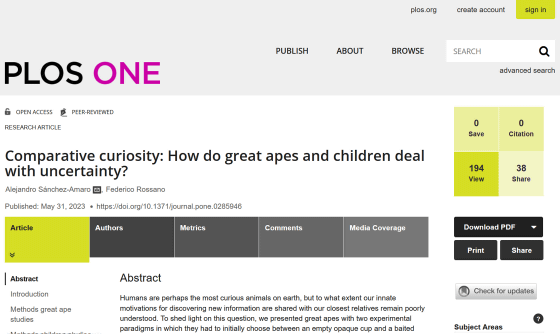Experiments show that humans want to open 'Pandora's box' more than other primates

Comparative curiosity: How do great apes and children deal with uncertainty? | PLOS ONE
https://doi.org/10.1371/journal.pone.0285946

The Temptation to Open Pandora's Box Could Set Us Apart From Other Apes : ScienceAlert
https://www.sciencealert.com/the-temptation-to-open-pandoras-box-could-set-us-apart-from-other-apes
A research team led by Alejandro Sanchez Amaro , who studies comparative cultural psychology at the Max Planck Institute for Evolutionary Anthropology in Germany, has found that humans exchange information in exchange for resources, even in the absence of clear benefits from past research . He pointed out that he knew what he was trying to get. “Humans are perhaps the most curious animals on earth, but it is not clear to what extent our innate motivation to learn new information is shared with our closest relatives. No,” he said.
Therefore, Amaro and his colleagues conducted experiments on human infants and primates to examine ``how often they open the cup with the unknown contents and the cup with the unknown contents, showing the cup with the unknown contents.'' I did.

In the first experiment, the research team targeted 29 primates such as chimpanzees, gorillas, bonobos, and orangutans. We conducted the first stage of the experiment by showing the yellow cup) and letting them choose one. One grape is contained in the red cup as a reward, nothing is contained in the yellow cup, and through the pre-test, the primate learns that ``the red cup contains one grape'' He said he did.
In the second stage of the experiment, the primate was shown a 'red cup' and a 'cup of another color whose contents cannot be seen (a green or blue cup instead of the yellow cup used in the first stage)' and asked the primate to I repeated the trial to let you choose. In the second stage, the new colored cups were divided into ``groups containing 3 grapes'' and ``groups without grapes'', and after the primates chose either cup, the contents of both cups were displayed. Disclosed.
And in the third stage, show the `` red cup '' and `` a new color cup whose contents cannot be seen (the cup of the color that was not used in the first or second stage) '', and which cup the primate chooses is said to have been investigated.

Subsequently, the research team conducted a similar experiment with 15 other primates, changing the red cup to a ``transparent cup that allows you to see the contents''. At this time, in the second stage, all primates were assigned to ``a group with three grapes in an opaque cup'', and it was investigated whether the percentage of choosing an opaque cup in the third stage would increase. I was.

In addition, the research team conducted a similar experiment with 72 human infants aged 3 to 5 with 'stickers' as rewards. It was investigated how often human infants opened the 'opaque cup' compared to primates.
After analyzing the results of a series of experiments, it was found that apes clearly prefer cups with clear contents until the contents of the ``invisible cup'' are revealed. On the other hand, when I learned that the invisible cup might have more rewards, it became my overwhelming preference for the invisible cup.

On the other hand, it was found that human infants are significantly more likely to choose invisible cups that do not know whether they contain stickers or not, even before the contents of the ``invisible cup'' are revealed. Human infants said that 52% of the total in the first stage and 85.4% in the second stage chose cups that do not know the contents.
The research team said, ``Overall, internal motivation strongly influenced the children's decision-making.'' ``The difference between children and primates can be said to be the difference in motivation to explore the unknown world.'' said.

Related Posts:







